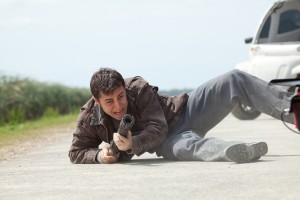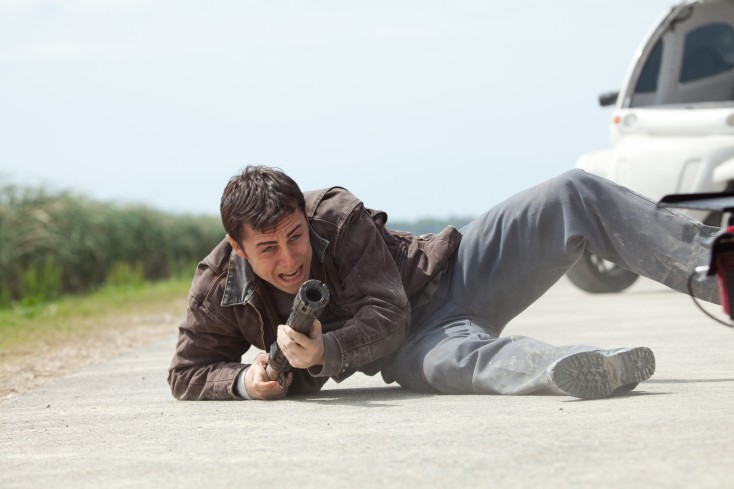
Joseph Gordon-Levitt as “Joe” in TriStar Pictures, Film District, and End Game Entertainment’s action thriller “LOOPER.” ©Looper LLC. CR: Alan Markfield.
By ANGELA DAWSON
Front Row Features
HOLLYWOOD—Joseph Gordon-Levitt is having quite a year. Having starred in the box office hit “The Dark Knight Rises” and the end-of-summer action thriller “Premium Rush,” as well as hosting “Saturday Night Live,” the busy performer is now playing Bruce Willis. Well, sort of.
The 31-year-old depicts the younger version of Willis’ character in “Looper,” a sci-fi thriller by writer-director Rian Johnson. Gordon-Levitt’s Joe is a hitman whose job is to kill old hitmen sent back from the future. Things get a bit tricky when he’s assigned to kill his older self, who isn’t going down without a fight. Making matters more complicated, young Joe becomes involved with a woman (“The Devil Wears Prada’s” Emily Blunt), who is trying to protect her young son (newcomer Pierce Gagnon) from a would-be assassin.
The dark eyed, slim actor says it was a fun challenge playing a version of the beefy iconic action star. He didn’t try to imitate Willis so much as try to deliver a believable version of the same character.
Q: Was it a challenge to have to take down the mannerisms of Bruce Willis?
Gordon-Levitt: Sure. My favorite thing as an actor is to become somebody else and really transform myself. And when I see something on the screen and any of it reminds me of me, I feel like I’ve messed it up. So I always want to disappear. My favorite actors are the chameleons, like Gary Oldman or Daniel Day-Lewis or Meryl Streep or Peter Sellers or people like that who you don’t see them on screen. And Looper really afforded me the opportunity to transform more than I have before in a movie. So it was just ideal for me.
Q: What were the little nuances that Bruce did that you really wanted to grab onto and do yourself?
Gordon-Levitt: One thing I noticed was Bruce has such a wonderful presence onscreen, you would assume that he’s loud, but he’s not. He’s actually quite soft-spoken. He doesn’t need to raise his voice; he has it innately. So that’s one thing I noticed that I tried to incorporate. You have to physically transform as well.
Q: So how did the fake eyebrows and nose and contact lenses help you transform?
Gordon-Levitt: I’m not going to tell you specifically because a magician never reveals his secrets. (He smiles.) But, yeah, it was three hours of makeup every day. It’s a bizarre experience looking in the mirror and seeing a different face. It’s a really inspiring thing.
Q: Was there anything you could impart to Pierce, the little boy you protect in the movie, since you also started out in show business as a youngster?
Gordon-Levitt: It brought back a lot of memories because I started working when I was six, and Pierce was five when we shot this movie. First off, he did such a great job; he made me so proud and the other thing I’d like to say is that he is nothing like that (character). He’s a really fun, jubilant little guy. But I wouldn’t give him advice. I wouldn’t talk down to him that way. He earned my respect as an actor so I just treated him like a colleague and a peer. He really came through.
Q: How do you wrap your head around time-travel movies?
Gordon-Levitt: I enjoy it for sure. And the mechanics of the time-travel in “Looper” is really simple. It’s not one of those time-travel movies that’s really about the time travel. It uses time travel as a springboard to ask a much more basic human question, which is what would you say to your future self if you could meet them. But it’s fun to kind of work it out.
Q: If you met the older you, what would you want to ask yourself?
Gordon-Levitt: Man, I would just listen. I don’t think I’d probably have anything to say. I find the wisest people do a lot more listening than talking.
Q: So what was your impression of this future that was set out kind of where we’re going?
Gordon-Levitt: If you just keep prioritizing the rich getting richer and not looking out for anyone else that is what we’ll happen. You’ll have the streets lined with tents in the middle of Kansas City (where “Looper” is set). “Looper” isn’t exactly about that. I think it’s really graceful and subtle how Rian (Johnson) just puts (the urban decay) that in the background. It is one of the things I really love about the movie.
Q: Since you worked before with Rian on “Brick,” do you feel you could anticipate what he wants from your performance at this point? Do you have a little secret language with him on set?
Gordon-Levitt: Yeah, I would actually say yes. I don’t know if I would call it a secret language exactly but we’ve watched countless movies together. We’ve spent endless hours talking about movies and he’s one of my best friends in the world. That absolutely helps when you’re on set to understand how he thinks. I think my job as an actor is to understand what the filmmaker has in mind and deliver the ingredients that he or she needs so they can cut the movie together. Rian is able to very definitely communicate to me what he wants.
Q: Do you have similar movie tastes? Are there some movies where he hated it and you loved it? Do you debate movies?
Gordon-Levitt: Some. I think we mostly tend to agree. I’m trying to think of any divergences that are of note. I think I might be a bit more of a sucker than he is.
Q: What are some of your favorite sci-fi movies and why?
Gordon-Levitt: There’s “The Matrix.” It’s one of my favorite movies of all time. The whole trilogy I actually really like. Why? I think the best sci-fi, and Rian probably said something like this, isn’t so much about the sci-fi. It uses a genre as a springboard to get it to the basic human questions. “The Matrix” gets at a lot of very basic human questions like what’s the point of being alive? What’s the difference between an individual and a society? Anyway, lots of questions like that that get dramatized in very interesting and fun ways. “Looper” does the same thing. It’s the basic human question about identity, fate and what you would say to your future self if you could have that conversation. It gets dramatized in a very fun way using the genre of science fiction and the device of time travel.
Q: You just made your directorial debut with “Don Jon’s Addiction.” What can you say about it?
Gordon-Levitt: I directed it, and we just finished shooting it a couple of months ago. Scarlett Johansson is in it, and Julianne Moore is in it, Tony Danza plays my dad. One thing I noticed with Rian, as well as Chris (Nolan), as well as Steven (Spielberg), that I really try to pay attention to, was, they strike a great balance between two ends of a spectrum: on the one hand, they’ve really done their homework and have a very thorough, preconceived vision for what they want the movie to be. On the other hand, they’re all open to spontaneity and collaboration, and that spectrum, I think, is right at the heart of what makes a good director.
Q: At the end of “The Dark Knight Rises” it looks like your character might go on to become Robin. Can you clear that up? What’s the story on that? Is there a film planned?
Gordon-Levitt: Not that I know of, and it’s really not up to me. I always choose my projects the same way; the filmmaker I really connect to and a story I really like, a script, but I don’t really take the ending of the movie that way. I think it’s just a really brilliant conclusion to that trilogy, to have a man other than Bruce Wayne in the Batcave. It speaks to themes that run through the whole trilogy, having to do with heroism and the fact that Batman is a symbol, and something more than just a man.
Q: Was the “SNL” gig to remind your audience that you grew up in comedy and have comedy chops?
Gordon-Levitt: That’s true. I grew up doing comedy in front of live studio audiences on “3rd Rock from the Sun.” Bonnie and Terry Turner, who created that show used to write for “SNL.” They wrote “Wayne’s World.” So, yeah, I feel at home doing comedy.





